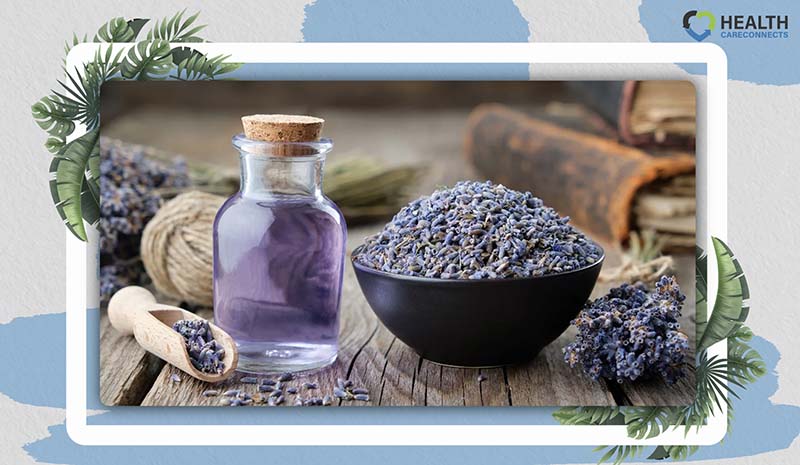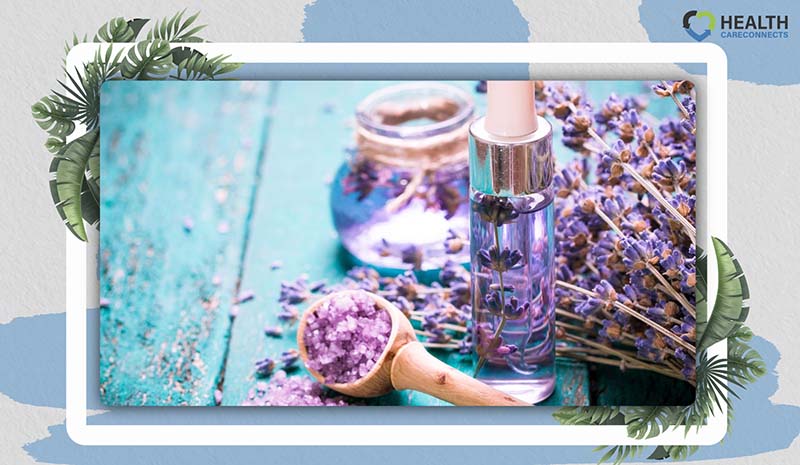Lavender oil, a highly-regarded essential oil with a rich history in traditional medicine, is celebrated for its calming and soothing effects, making it a staple in alternative medicine practices. It has been touted for its ability to alleviate itchy skin and potentially enhance hair health.
For those struggling with dandruff and scalp flaking, incorporating lavender oil into your hair care routine might seem like a hopeful remedy. Indeed, when used appropriately, this fragrant purple flower offers significant benefits for managing an itchy, inflamed scalp.
In this article, we’ll explore the benefits of lavender oil for hair, providing a detailed look at the science that supports its therapeutic properties and how to effectively integrate it into your hair care regimen. Let’s begin by understanding the fundamentals of this healing essential oil and examining its specific advantages for hair health.
Is Lavender Good for Hair?
Certainly, lavender is a remarkable choice for hair care. This potent, colorless essential oil is derived from the flowers and spikes of the lavender plant through a meticulous distillation process. It is celebrated not only for its complex composition of phytochemicals but also for its universally adored aroma, which has been cherished for centuries.
Lavender oil is a multifaceted gem in the world of essential oils. Its use extends beyond aromatherapy for its stress-relieving properties. It is also a popular ingredient in perfumes, massage oils, and many skincare and hair care products.

5 Benefits of Lavender Oil for Hair
Lavender oil offers a myriad of benefits for hair health, making it a prized ingredient in many hair care products. Here are some key advantages of incorporating lavender oil into your hair care routine:
Lavender Oil Aids in Promoting Hair Growth
Lavender oil has recently gained attention for its role in promoting hair growth. It helps thicken hair, encourage the development of new hair, and prevent hair loss.
Additionally, it conditions the hair, controls frizz, and boosts shine. Lavender oil is also beneficial for addressing issues like alopecia or pattern baldness.

Lavender Oil Can Help Prevent Lice
Head lice are both undesirable and uncomfortable. Lavender essential oil can help eliminate head lice and prevent their recurrence.
Using tea tree oil in conjunction with lavender oil can enhance these effects.
Lavender Oil Can Help Reduce Skin Inflammation
Lavender oil is effective in treating scalp infections, itchy scalp, and scalp dryness.
It reduces inflammation and speeds up the healing process, providing relief from these conditions.
Lavender Oil Provides a Soothing Effect and Fragrance to the Hair
Beyond its hair care benefits, lavender has a wonderful smell that can soothe the nervous system.
A 2012 experiment demonstrated that inhaling lavender fragrance led to increased relaxation, pleasure, and improved moods among human subjects.

Lavender Oil Possesses Antibacterial Properties
Lavender oil has antimicrobial properties, as noted in a 2014 review. It helps prevent the growth of bacteria and fungi.
When applied to the hair or scalp, it can prevent common issues such as itchy scalp, dandruff, and infections.
Lavender Oil Side Effects
While lavender oil is considered safe for most people, consider the potential side effects to ensure safe use:
- Skin Irritation: Pure lavender oil can be potent and may lead to skin irritation. It is advisable to always dilute lavender oil with a carrier oil, such as jojoba or olive oil, before applying it to your skin.
- Allergic Reactions: Although rare, allergic reactions to lavender oil are possible. To minimize risk, conduct a patch test by applying a small amount of diluted lavender oil to a discreet area of skin and monitor for any adverse reactions before using it more broadly.
- Hormonal Effects: Lavender oil exhibits mild estrogenic and anti-androgenic properties, which could influence hormone levels. Pregnant and nursing women should approach the use of lavender oil with caution and consider consulting with a healthcare professional.
- Ingestion Risks: Lavender oil should not be ingested unless it is specifically labeled as food-grade. Even then, it should only be used in very small quantities under the guidance of a healthcare provider, as it can be toxic.
How to Use Lavender Oil Effectively for Hair
To use lavender oil for hair, you can incorporate it into your routine through scalp massages, adding it to your hair products, using lavender hair serum, or creating a DIY hair mask. These methods can help promote a healthy scalp and stimulate hair growth.
Scalp Massage
Lavender oil is an excellent choice for massaging your scalp, especially if you’re experiencing hair loss. A gentle massage with lavender oil increases blood flow to the hair follicles, promoting healthy hair growth.
Additionally, it can provide a calming effect and nourish the scalp, contributing to overall scalp health and potentially reducing hair thinning.
How to use:
- Dilute a few drops of lavender oil with a carrier oil (such as coconut or jojoba oil).
- Perform a patch test to ensure you’re not allergic.
- Massage the mixture into your scalp using gentle, circular motions.
- Leave it on for 10-15 minutes before rinsing thoroughly.

Adding to Hair Products
Lavender oil can enhance your hair products. Adding a few drops to your shampoo or conditioner can benefit your scalp and promote hair growth while providing a calming fragrance.
How to use:
- Add 3-4 drops of lavender oil to your regular shampoo or conditioner.
- Use as usual, ensuring the product is evenly distributed across your scalp and hair.
- The soothing properties may help with scalp issues like itching or inflammation, and the pleasant scent offers relaxation benefits.
Using Lavender Hair Serum
Using lavender hair serum is an effective way to harness the benefits of lavender oil for promoting hair growth. The serum form allows for easy application and absorption into the scalp, delivering its nourishing properties directly where needed.
How to use:
- Apply a small amount of lavender hair serum onto your fingertips.
- Gently massage it into your scalp to promote circulation and allow the serum to penetrate deeply.
- Use it regularly to maintain a healthy scalp environment and provide relief from inflammation.
DIY Hair Mask
Lavender oil can be a beneficial ingredient in a do-it-yourself hair mask. Combining it with other natural ingredients creates a nourishing treatment that promotes scalp health and hair growth.
How to use:
Ingredients:
- 3-4 drops of lavender oil
- 2 tablespoons of coconut oil
- 1 teaspoon of honey
- 1 mashed avocado
Steps:
- Blend the lavender oil with coconut oil, honey, and mashed avocado.
- Apply the mask onto damp hair, starting at the scalp and working down to the ends.
- Leave the mask on for 30-45 minutes.
- Rinse thoroughly with lukewarm water.
Conclusion
In conclusion, the benefits of lavender oil for hair are substantial, offering a promising solution for enhancing hair growth and improving scalp health. Its potent antimicrobial properties help combat common scalp issues like dandruff and infections.
The soothing effects and pleasant aroma of lavender oil also contribute to relaxation and overall well-being, making it a popular choice for those looking to unwind. With its versatility in application, including scalp massages or as an additive to hair products, incorporating lavender oil into your hair care regimen is both practical and advantageous.
As research continues to unveil more benefits, the use of lavender oil for hair growth and health remains an exciting prospect for individuals experiencing hair loss or striving for better hair health.
For those seeking more information and honest product reviews, I recommend visiting HealthCareConnect.

Dr. Joyce Slater: Your Guide to Informed Health Choices
Dr. Joyce Slater shines as a distinguished expert in the field of nutrition and public health. Contributing her vast expertise to HealthConnectbc, she embodies a deep-seated passion for enhancing public well-being. As a respected figure in her field. Dr. Slater’s academic journey and professional achievements are nothing short of inspirational.
Holding a significant position as a researcher and educator, Dr. Slater has delved deeply into the intricacies of food literacy and nutritional science. Her work, prominently featured in numerous esteemed scientific publications, underscores her dedication to expanding our understanding of food’s role in health and society.
At the heart of Dr. Slater’s professional ethos is a profound desire to positively impact individual lives through education and research. She often says, “Empowering people with the knowledge to make healthier choices is the most rewarding aspect of my work.” This principle is the cornerstone of her involvement with HealthConnectbc, where she strives to provide reliable and practical health advice.
Dr. Slater’s contributions to HealthConnectbc are multifaceted: academically, she offers insights into the complex world of nutrition and health, enhancing both public understanding and professional practices. Additionally, she is instrumental in guiding and inspiring the next generation of health professionals, thus fostering future excellence in the field.
Juggling rigorous research with her educational duties, Dr. Slater demonstrates an unwavering commitment to her profession. Her approachable nature and genuine concern transcend the confines of academia, touching the lives of everyone she interacts with. Dr. Slater looks forward to continuing her journey of discovery and education, dedicated to the ongoing improvement of public health and nutrition.
At HealthConnectbc, Dr. J. Slater is not just a contributor; she is a guiding light, dedicated to enlightening and motivating individuals towards a healthier and more informed lifestyle.
PUBLISHED ARTICLES
- Food literacy competencies: A conceptual framework for youth transitioning to adulthood (2018)
- Self-perceived eating habits and food skills of Canadians (2016)
- Challenges to acquiring and utilizing food literacy: Perceptions of young Canadian adults (2016)
- Socio-demographic and geographic analysis of overweight and obesity in Canadian adults (2009)
- Sustainable well-being: Concepts, issues, and educational practices (2014)

